Boiler Installation Handforth
Top 10 New Boiler in Handforth
Receive up to 3 Boiler Replacement quotes for your project today! Compare profiles, reviews, accreditations, portfolio, etc... and choose the best service.

AHP Heating & Plumbing Co Ltd
4.817 reviewsCongleton, Cheshire, Unit 1, The Old Mill, Congleton Road, CW12 4RZ, GBAHP Heating & Plumbing Co. Ltd is a professional plumbing and heating company that provides a wide range of services, including new boiler installations, boiler servicing, and emergency repairs. We pride ourselves on our excellent customer service and high-quality workmanship. Our team of experienced engineers are fully qualified and Gas Safe registered, ensuring that all work is carried out to the highest standards. We also offer a loyalty scheme, which can help reduce annual servicing and maintenance costs. Our services include bathroom and en-suite remodelling, kitchen installations, and general plumbing and heating work. We are committed to providing a stress-free and efficient service, and we are always available to answer any questions or concerns you may have.
- Services
- Why Us?
- Accreditations
- Our Team
- Testimonials
- Gallery
Get Quote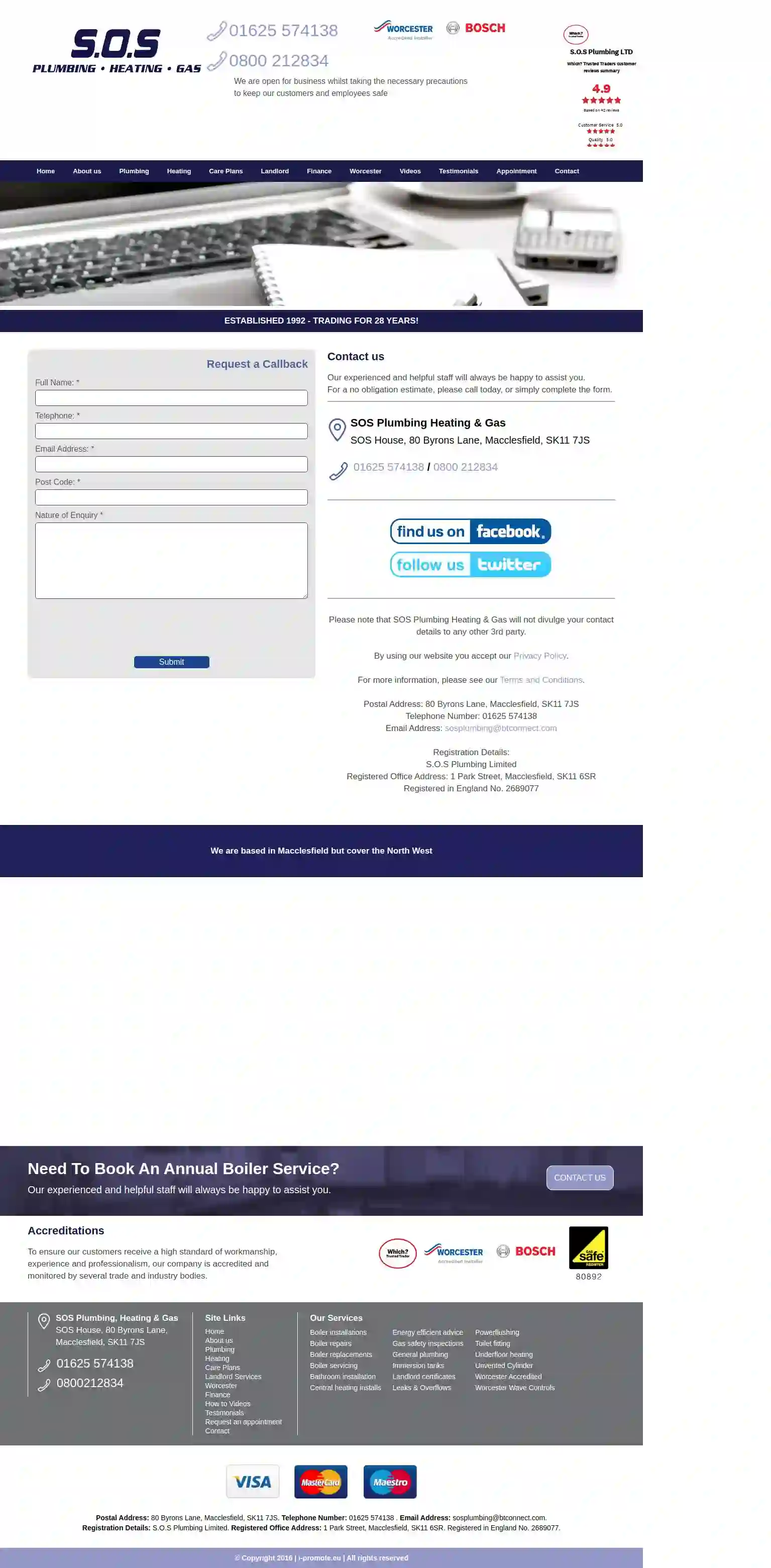
SOS Plumbing
51 reviewsSOS House, 80 Byrons Lane, Macclesfield, SK11 7JS, GBESTABLISHED 1992 - TRADING FOR 28 YEARS! S.O.S Plumbing was established in 1992. We have trading across the North West for 28 years in order to offer a quality plumbing, heating and gas breakdown service and maintenance company. 28 years later and we are still working to the same principles, providing a top class service to thousands of customers along the way. We have always, and still do, pride ourselves on our prompt, reliable, courteous and knowledgeable services. We pride ourselves in being an innovative company, keeping up to date with the latest products and systems to save our customers money and protect the environment. All our work is carried out by our own Gas Safe Registered engineers who all work to the highest standard with the minimum amount of disruption. We promise our customers the same high standard of service that our reputation has been built on for the past 28 years.
- Services
- Why Us?
- Accreditations
- Gallery
Get Quote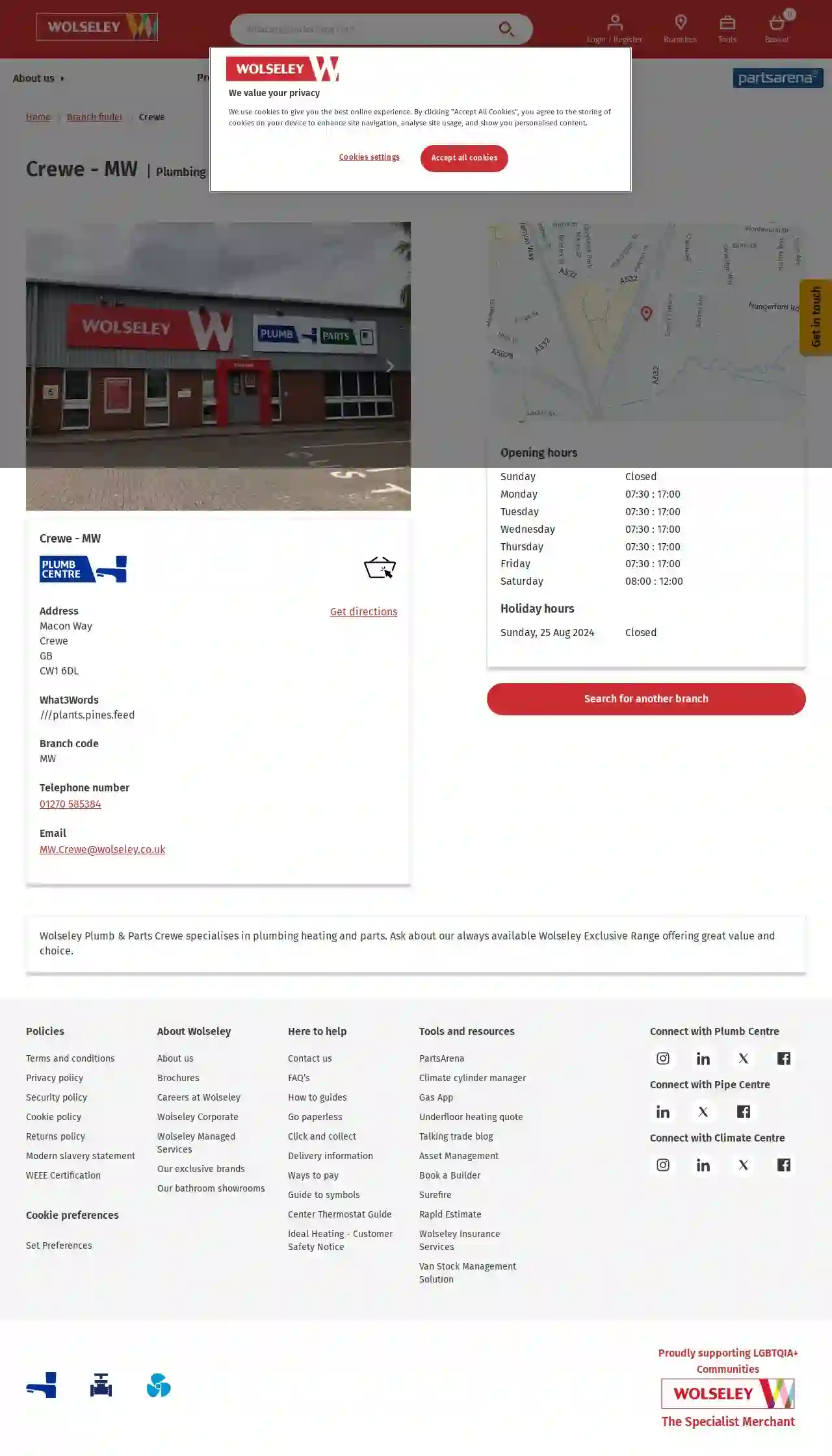
Wolseley Plumb & Parts
3.73 reviewsMacon Way, Crewe, GBCW1 6DL, GBWolseley Plumb & Parts Crewe specialises in plumbing heating and parts. Ask about our always available Wolseley Exclusive Range offering great value and choice.
- Services
- Why Us?
- Gallery
Get Quote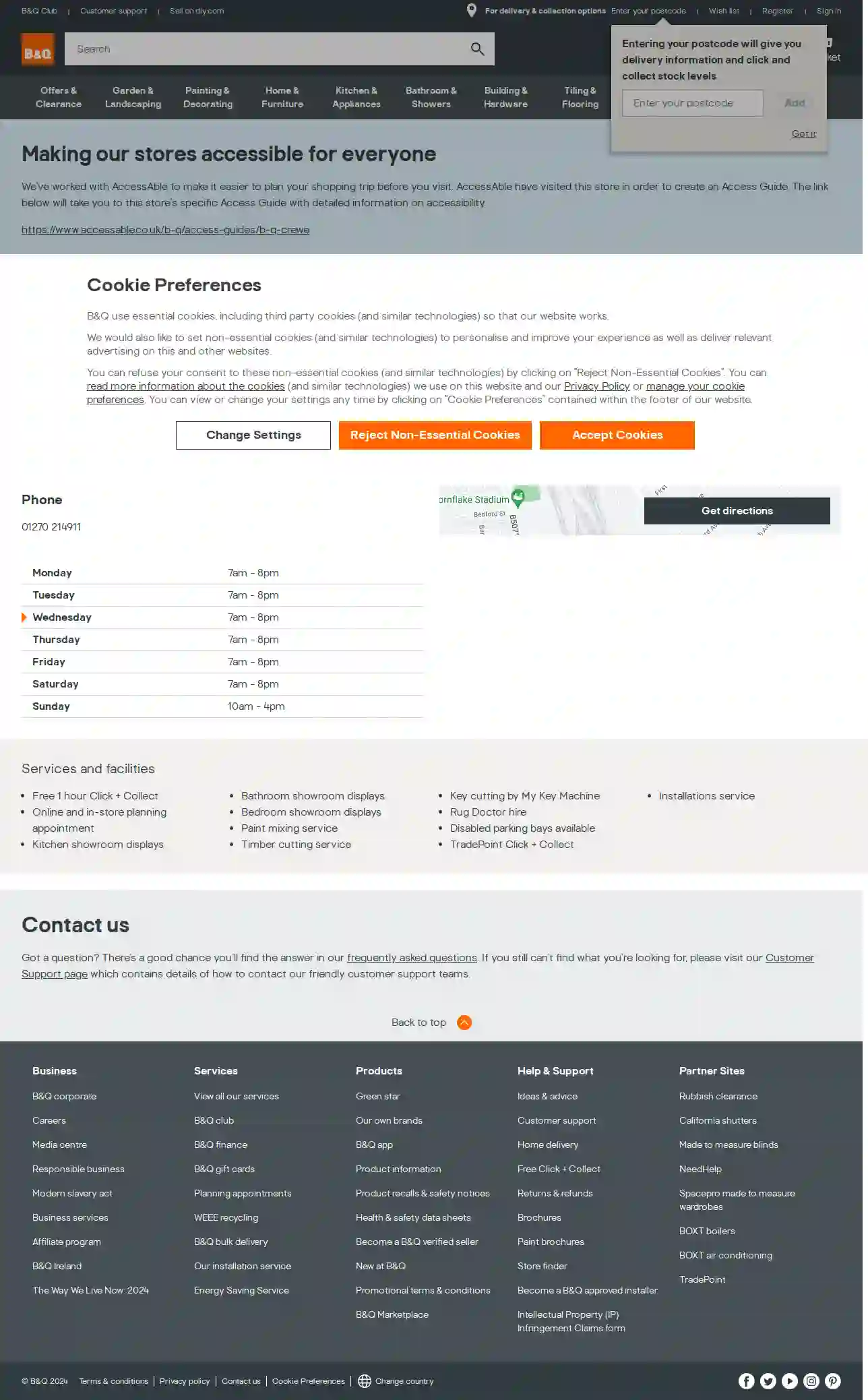
B&Q Crewe
4.1London Road, London, B&Q House, SW1A 1AA, GBB&Q is a leading home improvement retailer, offering a wide range of products and services to help customers create their perfect home. With over 300 stores across the UK and Ireland, B&Q is committed to providing excellent customer service and expert advice to help customers achieve their home improvement goals.
- Services
- Why Us?
- Accreditations
- Our Team
- Testimonials
- Gallery
Get Quote
Heatshield Ltd
56 reviews189a Queen Street, Crewe, CW1 4AU, GBHeatshield was founded in 2002 and are a family run Plumbing, Heating & Electrical company, based in Crewe. We have a very friendly and efficient team of Office staff as well as an extremely experienced team of Gas Engineers & Electricians who complete all their work to the highest standard and providing excellent Customer Service. We work for various new builds around Staffordshire & Cheshire working for some of the most recognised house builders. We also work for numerous different Letting Agents completing Certificates and Repairs in their rentals.
- Services
- Why Us?
- Gallery
Get Quote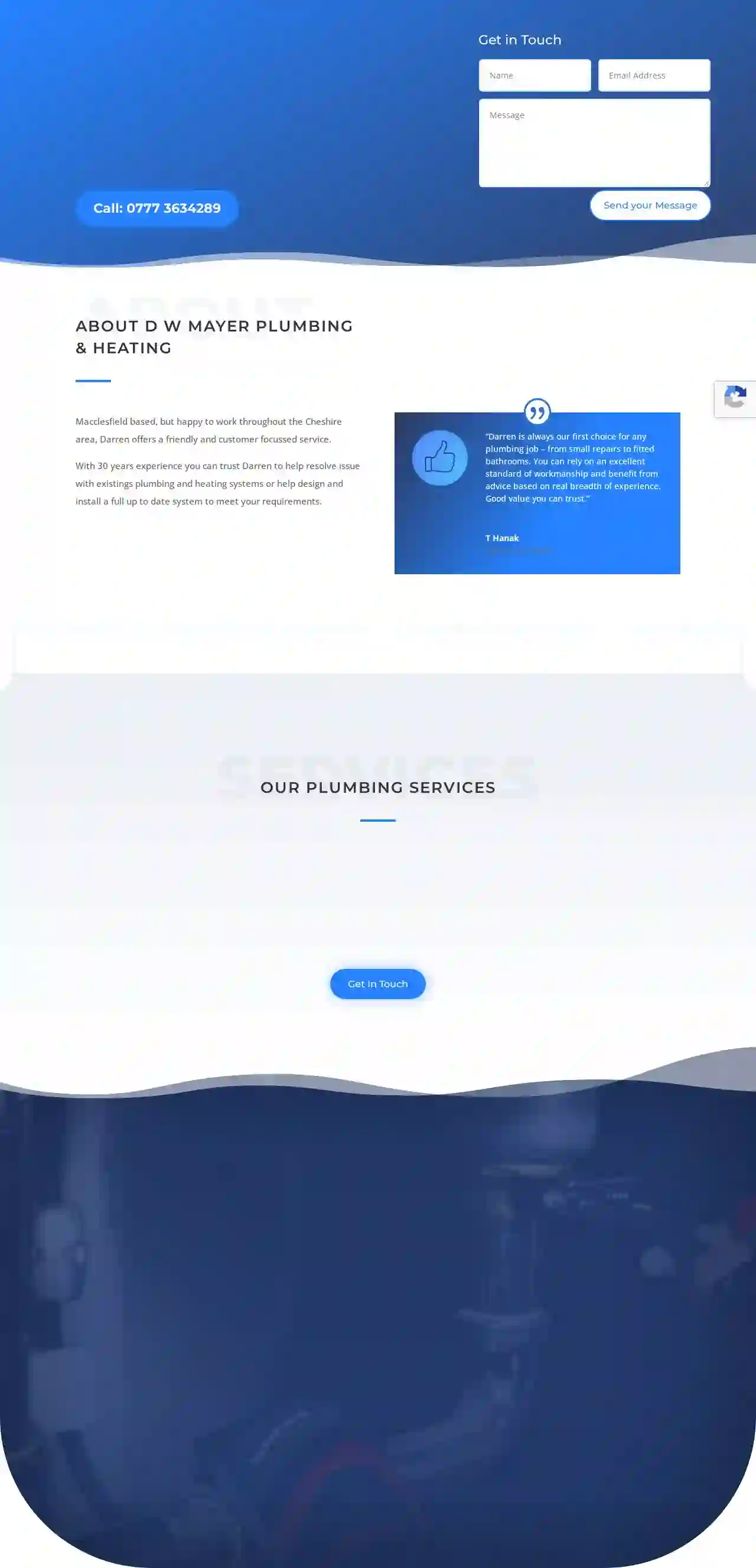
D W Mayer Plumbing & Heating
Macclesfield, GBMacclesfield based, but happy to work throughout the Cheshire area, Darren offers a friendly and customer focussed service. With 30 years experience you can trust Darren to help resolve issue with existings plumbing and heating systems or help design and install a full up to date system to meet your requirements. "Darren is always our first choice for any plumbing job – from small repairs to fitted bathrooms. You can rely on an excellent standard of workmanship and benefit from advice based on real breadth of experience. Good value you can trust." T Hanak
- Services
- Why Us?
- Our Team
- Testimonials
- Gallery
Get Quote
East Cheshire Heating
539 reviewsCongleton, GBEast Cheshire Heating offers reliable and efficient heating services tailored to your needs. Get an Instant Heat Pump EstimateGet an Instant Boiler QuoteGeneral EnquiriesAt East Cheshire Heating, we are passionate about providing high-quality heating services to our customers. Our experienced team has been serving the area for years, and we take pride in our reputation for excellence. 11 Years of Experience 676 Satisfied Customers 835 Heating Solutions Provided WHY CHOOSE EAST CHESHIRE HEATING Experienced Providers We are Gas safe registered and trained to the highest standards. We have years of experience providing heating services to homes in the area. Customized Solutions We understand that every customer has unique heating needs. That's why we offer customized solutions tailored to your specific requirements and budget. Quality Products We use only the highest quality heating products from trusted manufacturers to ensure long-lasting and efficient heating solutions. Expert Care At East Cheshire Heating, we take pride in providing expert care and attention to detail on every project we undertake. From installation to maintenance and repairs, we are committed to ensuring your complete satisfaction. OUR CUSTOMERS LOVE US “Asked Luke to come to do a service after some strange beeping from my boiler. He came round promptly as planned, was very knowledgeable and gave me some practical advice about my boiler. Would highly recommend!” Simon Gates “After 2 Central heating repairs and Corgi unable to repair a leaking shower pump we were able to find Luke. We could not have made a better choice, friendly, knowledgeable, punctual and efficient. Fully recommend his services.” Ken Capps “Luke has repaired our boiler today. We had an issue late last night. He was round by 9am the next day and we were back up and running by 10.30. Luke was friendly, professional and efficient. Would highly recommend and wouldn’t hesitate to use him in the future! Thanks Luke!” Charlotte Downing
- Services
- Why Us?
- Our Team
- Testimonials
- Gallery
Get Quote
Home Aids Services
4.887 reviewsStoke-On-Trent, 151 Newcastle St, ST6 3QJ, GBHome Aids Services is a well-established company with experienced whitegoods engineers covering North Staffordshire and South Cheshire. We have been in the domestic appliance repairs, sales, and servicing trade since 1976, over 40 years! Our specialist quality repairs and reputable servicing have extended to a wide variety of household brands, makes, and models. We hold extensive knowledge of all brands, from the oldest machine to the newest, allowing us to quickly identify the cause of any fault and recommend the most suitable fix. We're committed to giving our customers same-day, unbeatable services that they'll want to shout about for all the right reasons. Our many reviews on Facebook and Google are a testament to this, and we'll continue to do all it takes to maintain and better this reputation.
- Services
- Why Us?
- Accreditations
- Testimonials
- Gallery
Get Quote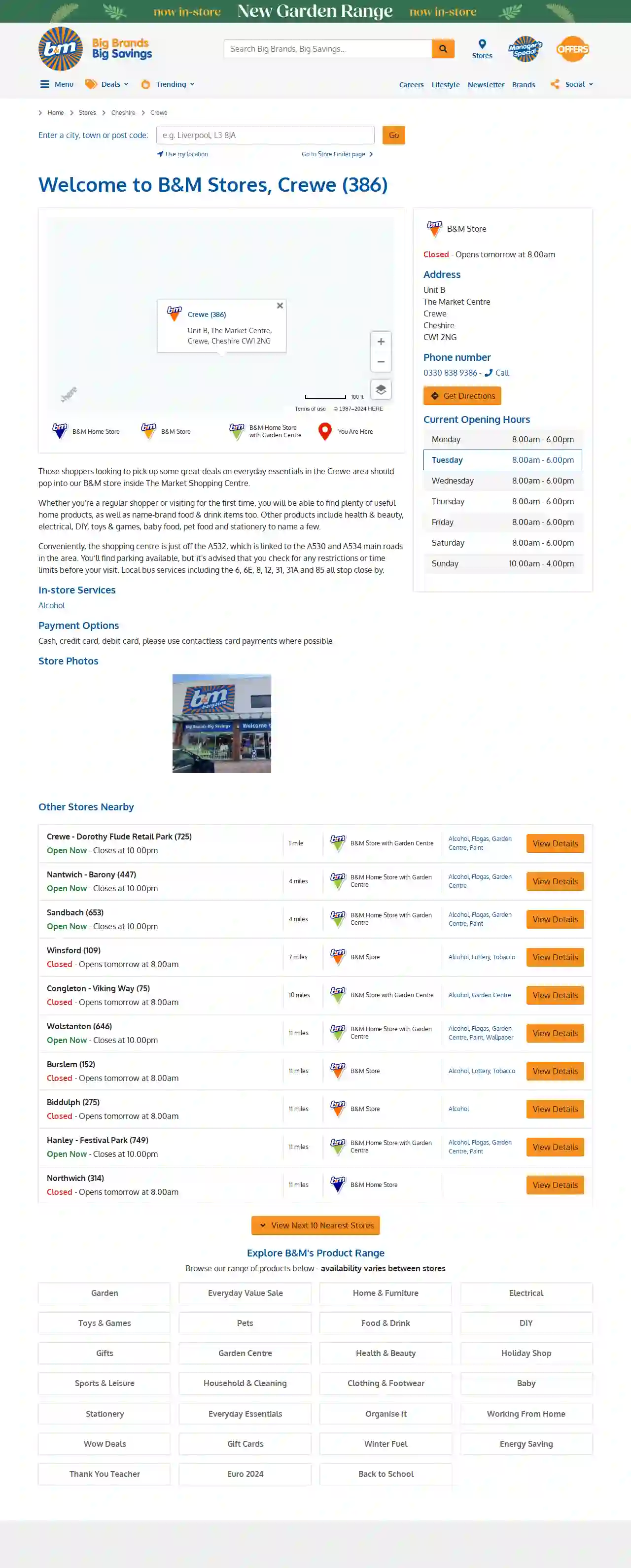
B&M Store
4.2858 reviewsThe Vault, Dakota Drive, Estuary Commerce Park, Speke, Liverpool, L24 8RJ, GBB&M Stores is a leading retailer of homeware, food, and general merchandise. With a rich history dating back to 1978, the company has grown to become one of the largest retailers in the UK. B&M Stores is committed to providing high-quality products at affordable prices, with a focus on customer satisfaction and community involvement.
- Services
- Why Us?
- Gallery
Get Quote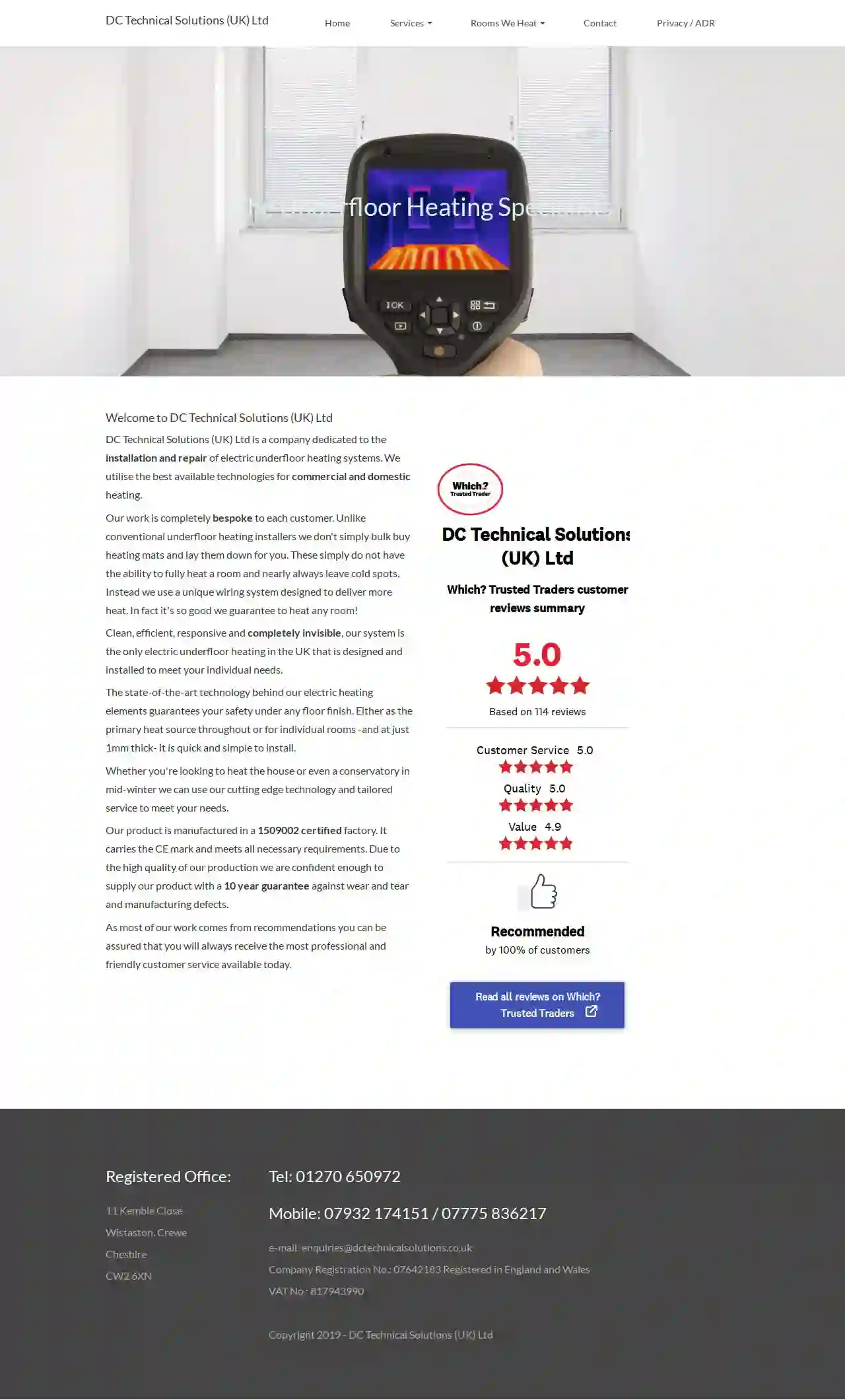
DC Technical Solutions
53 reviewsWistaston, Crewe, 11 Kemble Close, CW2 6XN, GBWelcome to DC Technical Solutions (UK) Ltd, a company dedicated to the installation and repair of electric underfloor heating systems. We utilise the best available technologies for commercial and domestic heating. Our work is completely bespoke to each customer, using a unique wiring system designed to deliver more heat. We guarantee to heat any room! Our product is manufactured in a 1509002 certified factory, carries the CE mark, and meets all necessary requirements. We are confident enough to supply our product with a 10 year guarantee against wear and tear and manufacturing defects. As most of our work comes from recommendations, you can be assured that you will always receive the most professional and friendly customer service available today.
- Services
- Why Us?
- Gallery
Get Quote
Over 12,692+ HVAC Contractors onboarded
Our HVAC companies operate in Handforth and surroundings!
HVACCompaniesHub has curated and vetted Top HVAC Companies arround Handforth. Find a top & reliable business today.
Frequently Asked Questions About Boiler Installation
- Upgrade to a high-efficiency condensing boiler: Condensing boilers are significantly more efficient than older non-condensing boilers.
- Install a programmable thermostat: A programmable thermostat helps regulate heating schedules, helping to reduce energy waste and lower heating costs. .
- Insulate your home: Adequate insulation in walls, attics, and floors can make a big difference.
- Service your boiler annually: Regular servicing ensures your boiler is running as efficiently as possible. .
- Powerflush your system: Remove buildup that interferes with your system's performance. It also extends the lifespan of your boiler.
- Experience and Qualifications: Make sure the installer is Gas Safe registered (for gas boilers) or OFTEC registered (for oil boilers) in the UK, or similarly qualified and licensed in your region. Verify that the installer has a solid track record with positive reviews.
- References and Reviews: Ask for references and check online reviews to assess the installer's reputation.
- Detailed Quotes: Get written, itemized quotes from multiple installers to compare costs and services.. Ensure the quote includes everything, such as the cost of the boiler, labor, parts, removal of the old boiler, and any necessary modifications to your plumbing or electrical systems.
- Warranty: Inquire about warranties on both parts and labor.
- Insurance: Verify that the installer has liability and workers' compensation insurance to protect you in case of accidents or damage.
- Payment Terms: Ask about their payment terms and any financing options they may offer.
- Age: If your boiler is more than 15 years old, it's likely to be less efficient and more prone to breakdowns. Newer boilers can significantly reduce energy bills.
- Frequent Repairs: Frequent repairs can be an indication of more problems to come. In some situations, replacing the system is more sensible.
- Inconsistent Heating: If your boiler takes a long time to heat up the radiators, has inconsistent water temperatures, or creates inconsistent temperatures across your property, it could be failing.
- Leaks and Drips: Any water leaks around your boiler indicate a problem and should be addressed by a professional immediately. .
- Unusual Noises: Strange noises like banging, kettling, or whistling coming from your boiler indicate that it's not operating optimally.
- Increasing Energy Bills: Higher utility costs, even with consistent energy usage habits , could be caused by a decrease in boiler efficiency.
- Yellow Flame: If the flame in your gas boiler is yellow instead of blue, it could indicate incomplete combustion, a sign that your boiler may need to be serviced or replaced. Contact a technician right away.
How can I make my boiler more energy-efficient?
How do I choose a boiler installer?
How do I turn off my boiler?
Do I need a new boiler?
How can I make my boiler more energy-efficient?
- Upgrade to a high-efficiency condensing boiler: Condensing boilers are significantly more efficient than older non-condensing boilers.
- Install a programmable thermostat: A programmable thermostat helps regulate heating schedules, helping to reduce energy waste and lower heating costs. .
- Insulate your home: Adequate insulation in walls, attics, and floors can make a big difference.
- Service your boiler annually: Regular servicing ensures your boiler is operating at optimal efficiency and safety.
- Powerflush your system: Over time, sludge and debris can build up in your heating system, reducing efficiency. A powerflush cleans the system, improving circulation and heat output.
How do I choose a boiler installer?
- Experience and Qualifications: Make sure the installer is Gas Safe registered (for gas boilers) or OFTEC registered (for oil boilers) in the UK, or similarly qualified and licensed in your region. Ask about their experience installing similar boiler systems.
- References and Reviews: See what others are saying about the company's work and customer service.
- Detailed Quotes: Get written, itemized quotes from multiple installers to compare costs and services.. Ensure the quote includes everything, such as the cost of the boiler, labor, parts, removal of the old boiler, and any necessary modifications to your plumbing or electrical systems.
- Warranty: Inquire about warranties on both parts and labor.
- Insurance: Verify that the installer has liability and workers' compensation insurance to protect you in case of accidents or damage.
- Payment Terms: Ask about their payment terms and any financing options they may offer.
How do I turn off my boiler?
Do I need a new boiler?
- Age: If your boiler is more than 15 years old, you should probably consider replacing it. Newer boilers can significantly reduce energy bills.
- Frequent Repairs: Frequent repairs can be a sign that it is more cost-effective to replace your boiler. .
- Inconsistent Heating: If your boiler takes a long time to heat up the radiators, has inconsistent water temperatures, or creates inconsistent temperatures across your property, it may be time for a new one. .
- Leaks and Drips: Any water leaks around your boiler require immediate professional service.
- Unusual Noises: Gurgling, rumbling, or clanking sounds coming from your boiler indicate that it's not operating optimally.
- Increasing Energy Bills: Higher utility costs, even with no changes in temperature settings, could be a sign of a less efficient boiler. .
- Yellow Flame: If the flame in your gas boiler is yellow instead of blue, it could indicate incomplete combustion, a sign that your boiler may need professional attention A yellow flame can also mean a dangerous carbon monoxide leak, so have it checked immediately. .